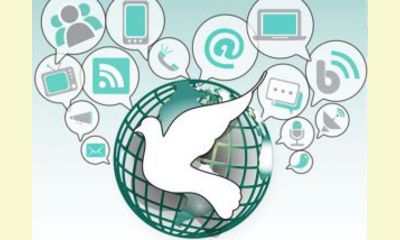|
|
Second International Congress on Science for Peace and Development [Argentina]
an article by Diario Norte (abridged)
The 2nd International Congress on Science for Peace and Development will be held on 12 and 13 November at the National Technological University (UTN). The event will begin with registration at 8 am, while the formal opening will be held at 9 am, with the first lecture by the Director of Diario Norte, Miguel Angel Fernandez.

click on photo to enlarge
In this edition of the conference, each day has a different theme. On the first day, the theme will be "The media as Peacebuilders", with leading media journalists. The discussion will be started by Miguel Ángel Fernández, the Director of Diario Norte, who will develop the theme "What is the true peace that we need?". Next will be Mr. Pedro Rettori, the Director of LRA 26 Radio Nacional with "Ethics and Peace in journalism. " Ending the first day, will be the Colombian Professor Dionne Cruz Arenas on "The media are important partners in building a Culture of Peace and Nonviolence: restrictions, ways and formulas".
On the second day, Tuesday, November 13, the theme will be "The best sign of peace is education." On this theme, Rep. Wilma Molina and Ms. Eugenia I. Garay will present "Law for the Promotion of Education and Culture of Peace and Nonviolence." Secondly, Miguel A. Garrido will present the Superior Technique of Peaceful Conflict Resolution. Immediately after the UTN students will present their Resistance University project about university social responsibility called "Costa Iné School - SOS help." To end the session, the Dean of the FRRe-UTN, Liliana Cuenca Pletsch, (Master in Engineering), and the Minister of Education, Prof. Francisco Romero will make the closing remarks of the 2nd International Conference on the Science for Peace and Development.
In addition to being the UTN college of engineering par excellence, the university promotes technology as a tool to achieve development and peace. In that sense, the Resistance University has hosted the Center for Peace Research since March 22, 2003, as one of the areas of training and discussion on this important topic. Therefore, and in commemoration of World Science Day for Peace and Development, theTechnology of Resistance - as proposed by director of the Center for Peace Research - along with the Ministry of Education, Science and Technology of the Province of Chaco, has organized the Second International Congress of Science for Peace and Development, based on the resounding success of the first Congress held in 2011 that was attended by more than 600 people in two days.
November 10 is World Science Day for Peace and Development, established by UNESCO in 2001. The objectives of the World Science Day for Peace and Development, are to promote the responsible use of science for the benefit of society in order to eradicate poverty and promote peace in the world.
"Peace" means not only the absence of war, it also means equality, fairness, tolerance, respect, education, health, in short, it means the ability to live together in harmony to build a future for all. . .
(Click here for a Spanish version of this article)
|








|
DISCUSSION
Question(s) related to this article:
How can we get to a sustainable, peaceful economy?,
* * * * *
LATEST READER COMMENT:
Annie Leonard: How to Be More than a Mindful Consumer
The way we make and use stuff is harming the world—and ourselves. To create a system that works, we can't just use our purchasing power. We must turn it into citizen power.
by Annie Leonard
posted Aug 22, 2013
Stuff activist Annie Leonard: “Consumerism, even when it tries to embrace ‘sustainable’ products, is a set of values that teaches us to define ourselves, communicate our identity, and seek meaning through accumulation of stuff, rather than through our values and activities and our community.” YES! photo by Lane Hartwell.
Since I released "The Story of Stuff" six years ago, the most frequent snarky remark I get from people trying to take me down a notch is about my own stuff: Don't you drive a car? What about your computer and your cellphone? What about your books? (To the last one, I answer that the book was printed on paper made from trash, not trees, but that doesn't stop them from smiling smugly at having exposed me as a materialistic hypocrite. Gotcha!)
Let me say it clearly: I'm neither for nor against stuff. I like stuff if it's well-made, honestly marketed, used for a long time, and at the end of its life recycled in a way that doesn't trash the planet, poison people, or exploit workers. Our stuff should not be artifacts of indulgence and disposability, like toys that are forgotten 15 minutes after the wrapping comes off, but things that are both practical and meaningful. British philosopher William Morris said it best: "Have nothing in your house that you do not know to be useful or believe to be beautiful."
Too many T-shirts
The life cycle of a simple cotton T-shirt—worldwide, 4 billion are made, sold, and discarded each year—knits together a chain of seemingly intractable problems, from the elusive definition of sustainable agriculture to the greed and classism of fashion marketing.
The story of a T-shirt not only gives us insight into the complexity of our relationship with even the simplest stuff; it also demonstrates why consumer activism—boycotting or avoiding products that don’t meet our personal standards for sustainability and fairness—will never be enough to bring about real and lasting change. Like a vast Venn diagram covering the entire planet, the environmental and social impacts of cheap T-shirts overlap and intersect on many layers, making it impossible to fix one without addressing the others.
I confess that my T-shirt drawer is so full it's hard to close. . ...more.

|
|









